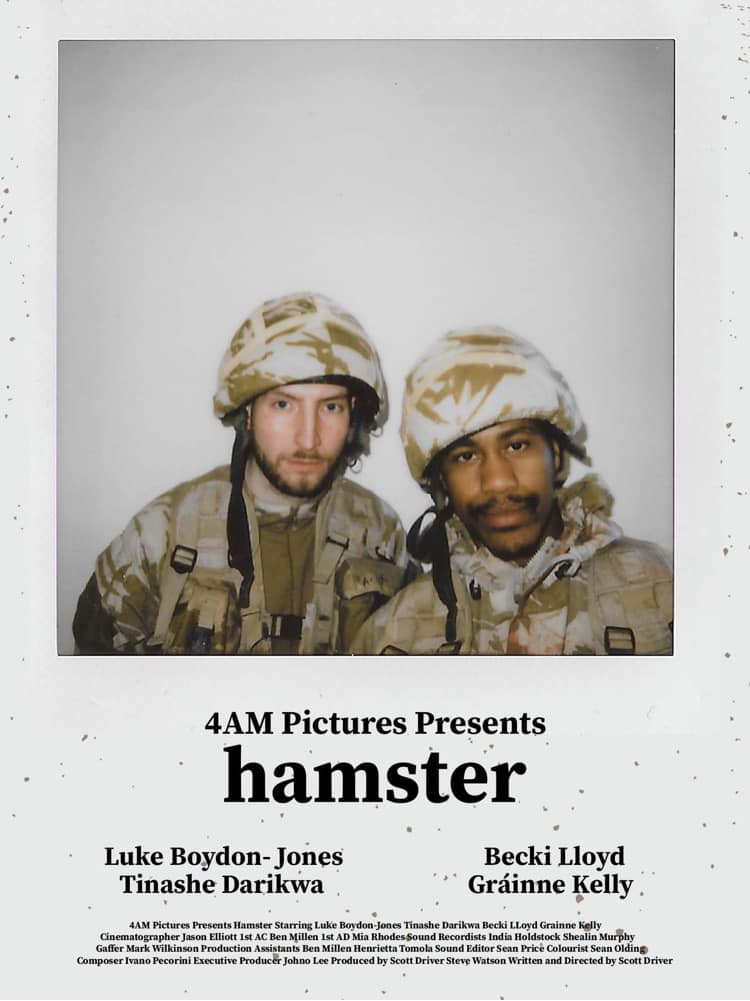Midlands Review of Hamster

Hamster
Directed by Scott Driver
2022
4AM Pictures
“There are 2.5 million members of the ex-forces community living in England today.”
Hamster is a new 30-minute drama film from Scott Driver which delves deep into the effects of war on military personnel, PTSD and the need for support for those who have left the armed forces.
We begin with a group of new recruits on a bus looking concerned about their future before we move forward in time to see Lewis (Luke Boydon-Jones) return home and warmly welcomed by his loving mother.
Shots of a once-sporty and social homelife contrast against how Lewis feels (“weird”) and the adjustment to domestic routine appears to conflict against the withdrawn man’s demeanour. And his mother introduces him to a new pet hamster she got to combat her loneliness whilst he unpacks his bags.
But the safe return home is saddened as Lewis passes on the service medal of his dead friend (an excellent Tinashe Darikwa as Jason in a brief but important role) over to the man’s bereaved mum and dad.
Lewis explains the emotional story of his passing in a warzone yet behind the honest tears seems to lurk a more troubled disposition – clearly related to the beginnings of PTSD.
Interspersed by flashbacks with his friend, the film ramps up the effects of his condition as even small things set off haunting mental reminders and sounds of warfare. High-pitched noises, quick cuts and muffled and echo-y dialogue show the director’s skill in using a variety of methods to convey the condition.
The locked-up animal parallel to the pet hamster are obvious, but more cleverly it symbolises a surrogate son to his mum in his absence - but more interestingly also represents a soft nature rather than the obvious and over-used caged tiger metaphor.
Luke Boydon-Jones (from the director’s previous film Venari – our review here) does extremely well with the material. He captures both the protagonist’s withdrawn nature but also delivers a fidgety nervousness combined with agitation to great effect. This really draws in the audience making us as off-footed and uncomfortable as he is.
The film also shows him drinking alone before he hangs out with friends but his conversations are awkward and stilted – no longer having much in common with his footy-loving mates.
His reluctance to ask for help and his withdrawn nature are common effects for ex-service people and he also faces immense frustration when one friend calls him a “hero”.
The film explores the many complicated issues surrounding its central theme and highlights areas such as physical and mental health, the access to support groups as well as the importance of communication and the need to talk things through. Without these there are more than just suggestions within the film how their absence could lead to self-harm and worse.
Technically there’s a flair of film techniques used with the editing by the director and Chris Clarke clearly demonstrating the story to its best ability and the handheld camera and close-ups provide an intimacy to this man’s journey.
As we head towards the film’s conclusion we see the back-story of Lewis and Jason’s combat time and his friend’s demise. There is a clear hint of what Lewis has held inside to protect Jason’s loved ones from the horrors he has himself experienced.
A powerful and moving film, Hamster has a tour-de-force central performance from Luke Boyden-Jones who showcases humanity, guilt and outrage all with the understanding of the subtleties a battle-scarred role like this requires. And long after it’s over, you’ll appreciate how the film balances all these difficult issues with a sincere and delicate touch.
Finally, it also offers a lifeline - by showing the importance of support groups, offloading and sharing – to those souls putting themselves in danger, in the hope it could even lead to a much-needed hint of a smile once they're back.
★★★★★
5/5
Michael Sales





